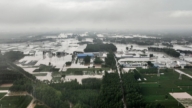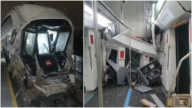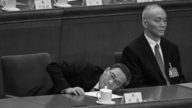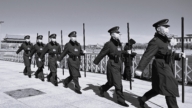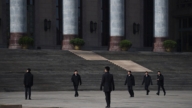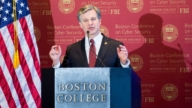【新唐人2014年04月30日讯】美国总统欧巴马访问亚洲四国,加强了与日本、菲律宾等国的军事同盟关系,形成岛链包围中国。美军还同时准备向亚太盟国派驻B-2隐形轰炸机、增加航空母舰演习等行动,压制中共在东海及南海的“挑衅行动”。对此,中共军方一些将领也提出“今夜准备打仗”的口号。那么,美、中关系下一步会如何发展?请看报导。
美国在28号与菲律宾签署一项协定,允许美军在菲律宾部署军队、舰船和飞机等。这代表着更多的美军将调往菲律宾。
菲国“宾德拉萨大学”美菲关系专家卡斯特罗说:此协议将改变南海形势,向中国表明:“我们盯着你!”
近年来,中共与菲律宾等国,在南中国海因领土争端多次对抗。在南海水域,中国船只分别与美国舰船、印尼军舰、越南勘测船发生过对峙。
但最严重的是在2012年4月份,中国海监船曾与菲律宾一艘军舰和海岸警卫队船只,在黄岩岛发生长达一个月的紧张对峙。
不仅是南中国海,在东海,中共近年来与日本在“钓鱼岛”问题上,也是纠缠不休。
不过,这次欧巴马访问日本时表示,美国在条约中对日本的安保承诺是“绝对的”。
其实,与欧巴马行动相呼应的是,美国军方也做好了准备。
美国《华尔街日报》引述美国官员的话表示,美国军方已经准备了多种方案,将强有力的应对中共未来在南中国海和东海的任何“挑衅行动”。这些方案包括向邻近中国地区派出B-2隐形轰炸机、和扩大美国战机的侦察飞行规模、派遣航母进入中国沿海附近的有争议水域,以及在接近中国沿海区域范围内举行航空母舰演习等。
这一新方案是美军太平洋司令部(U.S. Pacific Command)在近几个月制定的。
台湾政治大学国际关系研究中心教授严震生:“我认为,其实美国希望看到的是,不要让这一些紧张的关系未来一旦触发,不可收拾,像中东的情况一样。所以是等于进行某种程度的吓阻。”
台湾“政治大学国际关系研究中心”教授严震生认为,美国是希望通过加强盟国的军事实力,达到区域内军事实力平衡,从而降低战争风险。
美国联合日本、菲律宾,在东海及南海对中国形成夹击之势,让中共一些人很不爽。
中共军队南海舰队政治指挥员汤谷生,在中共官媒《人民日报》上发表措词强硬文章,要求以“今夜准备打仗”的姿态应对国际风云。鹰派少将罗援也指出,欧巴马对日本和菲律宾的表态,目地是恫吓中国(中共)。他提醒中共军队随时需要做好今天晚上就能作战的准备,保持能打仗、打胜仗的姿态。
台湾政治大学教授丁树范:“解放军这些退休将领,他表达气愤、不满,要准备打仗,也不会觉得很意外。问题是真正这些政治领导人或者高层现役军事领导人他们是怎么想的,可能是另外一回事。”
中共海军司令吴胜利,在山东青岛最近举行的“西太海军论坛”第14次年会上说,当前东海形势严峻,中、日海军有擦枪走火的可能性,需要研究如何与日方“擦枪而不走火”。
香港《太阳报》对此表示质疑,报导说,如果中方连“走火”都没有准备好,又如何应对毁灭性的战火?如果连对日本都怕“走火”,又如何应对日本背后的美国呢?
文章分析,中共并非不想战,是不能战。因为目前中共军方,连军委副主席、总后勤部副部长都贪腐,谁能保证那些武器在关键时刻一定能发挥作用?
台湾“政治大学”教授丁树范指出,虽然中共中央军委主席习近平也说过“军队要准备打仗”之类的话,但他更大的用意是对内的需要,不仅是对付军队、或地方腐败分子,更是巩固自己权力的需要。
丁树范表示,目前中共也没有打仗的迫切性。
采访/陈汉 编辑/宋风 后制/李勇
Obama’s Asia visit and the military alliance: what should the CCP do?
Anchor: The U.S. President Barack Obama visited four Asian
countries. He strengthened the military alliance with Japan
and the Philippines and formed a chain of islands to surround
China. The U.S. also deployed B-2 stealth bombers for the Asia-
Pacific allies and increased aircraft carrier exercises. These
actions are conducted to suppress the “provocative acts" of
the CCP in the East China Sea and South China Sea. In this
regard, the CCP military generals also made up slogans such as
“to fight tonight". Therefore, how to develop US-China
relations next?
Voice: On Apr. 28, the United States and the Philippines
signed an agreement which allows the U.S. to deploy troops,
ships and aircraft in the Philippines. It means that more U.S.
troops will be transferred to the Philippines.
The US-Philippine relations expert Castro from De La Salle
University Philippines said that this agreement will change
the situation in the South China Sea. It is a message to China:
“We stare at you!"
In recent years, there have been many repeated confrontations
between the CCP, the Philippines and other countries in the
South China Sea due to territorial disputes. In the South
China Sea, a confrontation occurred between Chinese
boats and the warships or survey vessels from the United
States, Indonesia and Vietnam.
The most serious event happened in April 2012, when a
month-long tense confrontation occurred in Huangyan
Island between a Chinese ocean surveillance ship, one
Philippine warship and the Coast Guard boats.
It’s not onlythe South China Sea, “the Diaoyu Islands"
problem has entangled the CCP and Japan in recent years in the
East China Sea.
However, when Obama visited Japan, he said that the U. S.
commitment for the protection of Japan is “absolutely" in the
treaty.
In fact, the U.S. military is ready for action in response to
Obama.
The Wall Street Journal quoted U.S. officials as saying that
the U.S. military has prepared a variety of programs, which
could be the strong responses to any “provocative actions" of
the CCP in the South China Sea and East China Sea in future.
These programs include dispatching B-2 stealth bombers in
the neighboring regions of China, increasing the reconnaissance
flights of U.S. warplanes, sending aircraft carriers into the
disputed waters close to China, and holding of aircraft
carrier exercises close to China, etc.
This new program was developed by the U.S. Pacific
Command (US Pacific Command) in recent months.
Yen, Chen-Shen, a professor at the Institute of International
Relations, National Chengchi University said: “I think, the
United States does not want to let these tense relations become
a trigger in the future, which could be as out of control as the
situation in the Middle East. It is equal to deterrence to some
extent."
Yen, Chen-Shen thought that the U.S. hopes to reach a
balance of military strength in the region by strengthening the
military strength of the allies. Therefore, the risk of war would
be reduced.
The pincer attack formation made by the U.S., Japan and the
Philippines makes some CCP people very unhappy.
Tang Gusheng, the political commander of the South China
Sea Fleet published a strongly worded article in People’s Daily
– the CCP official media and required “to fight tonight” to
deal with the international situation. The hawks Major General
Luo Yuan also pointed out that Obama wanted to intimidate
China (CCP) by showing his attitude to Japan and the
Philippines. He reminded the CCP military needs to be able to
fight tonight and keep up a fighting and victorious gesture.
Ding Shufan, the professor at National Chengchi University:
“These retired PLA generals expressed anger, resentment and
they mentioned to prepare a fight. These are not so very
unexpected. The problem is how the current political leaders
or senior military leaders think. It might be a different matter."
Wu Shengli, the CCP Navy Commander said in the 14th
Western Pacific Naval Symposium (Qingdao, Shandong) that
the current situation in the East China Sea is grim. There is
a possibility of misfires between the China and Japan navies.
There is a need to study how to “fight without fire".
The Sun in Hong Kong expressed their doubts. It was
reported that if the CCP is not ready for the “fire", how to deal
with the devastating war? If the CCP is afraid of “fire" with
Japan, then how to deal with the United States?
This article analyzed that the CCP wants to fight, but they can
not. In the current Chinese military, even the Central Military
Commission Vice Chairman and the deputy minister of the
General Logistics Department are corrupt, who can guarantee
that those weapons will be able to play a role at a critical
moment?
Ting Shufan pointed out that although the CCP Central
Military Commission Chairman Xi Jinping also said that the
military must prepare to fight, his intention was to the internal
needs – not only to deal with the military or local
corruption, but also to consolidate his power.
Ding Shufan said that there is no war urgency for the CCP at
present.
Interview/Chen Han Edit/Song Feng Post-Production/Li Yong


